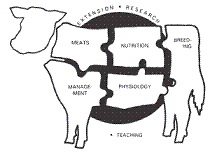Animal Science, Department of

Nebraska Beef Cattle Reports
Date of this Version
2023
Citation
2023 Nebraska Beef Cattle Report
UNL Beef, Institute of Agriculture and Natural Resources, University of Nebraska-Lincoln
Abstract
An acidosis challenge study was conducted comparing different administration techniques for LactiproFLX, a direct fed microbial product containing Megaspharea elsdenii (a lactate-utilizing bacteria) for the prevention of acidosis. Four treatments were utilized in a randomized block design with 24 ruminally cannulated steers. Treatments consisted of a control group which did not receive the product, a group which received the commercial dose of the product four days before the acidosis challenge, one which received the commercial dose of the product one day before the challenge, and one which received ten times the commercial dose one day before the challenge. No differences were detected for rumination time or dry matter intake. Similarly, no differences were detected in the millimolar (mM) concentrations of propionate, valerate, or isovalerate. Several differences, however, were detected for total volatime fatty acid (VFA), acetate, isobutyrate, and butyrate during different periods of the study. Additionally, several differences were detected for ruminal pH parameters with the treatment dosed 4 days before the challenge having the greatest minimum and maximum pH when compared to the other treatments. The group dosed with ten times the commercial dose displayed lower pH variance and magnitude of change when compared to the other treatments. Therefore, if using exogenous Megaspharea elsdenii as an acidosis mitigation strategy, giving the bacteria time to establish in the rumen before an acidotic event could increase the effectiveness of the treatment. If giving the treatment closer to a possible acidotic event, giving a higher dose could be beneficial.
Included in
Large or Food Animal and Equine Medicine Commons, Meat Science Commons, Veterinary Preventive Medicine, Epidemiology, and Public Health Commons

